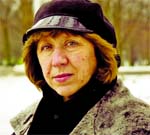
The Guardian :Svetlana Alexievich, the Belarusian writer whose oral histories have recorded thousands of individual voices to map the implosion of the Soviet Union, has won the Nobel prize for Literature.The Swedish Academy, announcing her win, praised Alexievich’s “polyphonic writings”, describing them as a “monument to suffering and courage in our time”.She becomes the 14th woman to win the prize since it was first awarded in 1901. The last woman to win, Canada’s Alice Munro, was handed the award in 2013. Speaking by phone to the Swedish broadcaster SVT, Svetlana Alexievich said that the award left her with a “complicated” feeling. “It immediately evokes such great names as [Ivan] Bunin, [Boris] Pasternak,” she said, referring to Russian writers who have won the prize. “On the one hand, it’s such a fantastic feeling, but it’s also a bit disturbing.”The academy called while she was at home, “doing the ironing,” she said, adding that the 8m Swedish krona (£775,000) prize would “buy her freedom”.”It takes me a long time to write my books, from five to 10 years. I have two ideas for new books so I’m pleased that I will now have the freedom to work on them.”Alexievich was born on the 31 May 1948 in the Ukrainian town of Ivano-Frankovsk into a family of a serviceman. Her father is Belarusian and her mother is Ukrainian. After her father’s demobilisation from the army the family returned to his native Belorussia and settled in a village where both parents worked as schoolteachers. She left school to work as a reporter on the local paper in the town of Narovl.She has written short stories, essays and reportage but says she found her voice under the influence of the Belorusian writer Ales Adamovich, who developed a genre which he variously called the “collective novel”, “novel-oratorio”, “novel-evidence”, “people talking about themselves” and the “epic chorus”.According to Sara Danius, the permanent secretary of the Swedish Academy, Alexeivich is an “extraordinary” writer.”For the past 30 or 40 years she’s been busy mapping the Soviet and post soviet individual,” Danius said, “but it’s not really about a history of events. It’s a history of emotions – what she’s offering us is really an emotional world, so these historical events she’s covering in her various books, for example the Chernobyl disaster, the Soviet war in Afghanistan, these are in a way just pretexts for exploring the Soviet individual and the post-Soviet individual.””She’s conducted thousands and thousands of interviews with children, with women and with men, and in this way she’s offering us a history of human beings about whom we didn’t know that much … and at the same time she’s offering us a history of emotions, a history of the soul.”Danius also praised Alexievich for devising “a new kind of literary genre”, and pointed new readers towards her first book U vojny ne ženskoe lico (War’s Unwomanly Face), based on interviews with hundreds of women who participated in the second world war. “It’s an exploration of the second world war from a perspective that was, before that book, almost completely unknown,” she said. “It tells the story of the hundreds and hundreds of women who were at the front in the second world war. Almost one million Soviet women participated in the war, and it’s a largely unknown history. It was a huge success in the Soviet Union union when published, and sold more than 2m copies. It’s a touching document and at the same time brings you very close to every individual, and in a few years they all will be gone.”Although Alexievich is widely translated into German, French and Swedish, winning a range of major prizes for her work, English editions of her work are sparse. Independent publisher Fitzcarraldo Editions will release her new book, Second-hand Time, in English next year, after editor Jacques Testard read it in French a few years ago. “It’s an oral history, as are all her books, about nostalgia for the Soviet Union,” said Testard. “She went around Russia interviewing people after the fall of the Soviet Union, in an attempt to surmise what the collective post Soviet psyche is. As with all her books, it’s really harrowing – a story about loss of identity, about finding yourself in a country which you don’t recognise any more. It’s a micro-historical survey of Russia in the second half of the 20th century, and it goes up to the Putin years.”Testard read the book in French a couple of years ago. “She’s been a big deal in Europe for a long time, but she’s never really been picked up in England,” he said.”Her books are very unusual and difficult to categorise. They’re technically non-fiction, but English and American publishers are loath to take risks on a book just because it’s good, without something like a Nobel prize.” Alexievich led the odds for the 2015 award, ahead of Japan’s Haruki Murakami, Kenya’s Ngugi wa Thiong’o and the Norwegian playwright Jon Fosse.

